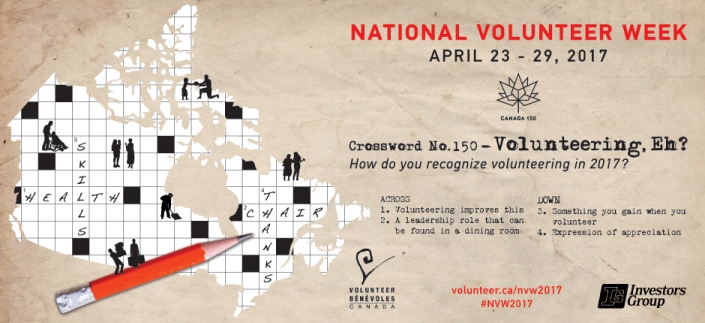 “However you recognize volunteering in 2017, one thing remains timeless…and that is volunteer efforts create positive impact in communities across Canada.” This quote from Volunteer Canada couldn’t ring more true here at The ArQuives. In 2016, our 150+ volunteers devoted over 12000 hours to not only preserving materials from Canada’s gay and lesbian history, but digitizing them and facilitating public engagement and access. This year, and every year, we want to celebrate the work and time our volunteers contribute to making The ArQuives a trusted guardian of LGBTQ+ histories. Last year for National Volunteer Week we featured some of our amazing committee chairs. This year we’ve decided to feature some of our newer volunteers to The ArQuives, whose roles range from collections to community engagement.
“However you recognize volunteering in 2017, one thing remains timeless…and that is volunteer efforts create positive impact in communities across Canada.” This quote from Volunteer Canada couldn’t ring more true here at The ArQuives. In 2016, our 150+ volunteers devoted over 12000 hours to not only preserving materials from Canada’s gay and lesbian history, but digitizing them and facilitating public engagement and access. This year, and every year, we want to celebrate the work and time our volunteers contribute to making The ArQuives a trusted guardian of LGBTQ+ histories. Last year for National Volunteer Week we featured some of our amazing committee chairs. This year we’ve decided to feature some of our newer volunteers to The ArQuives, whose roles range from collections to community engagement.
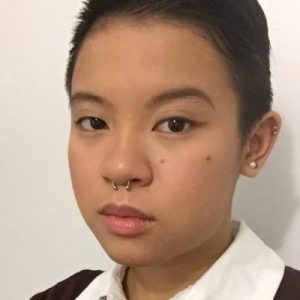 Sarah Quinto (Community Engagement)
Sarah Quinto (Community Engagement)
“My name is Sarah. I use she/they pronouns. I’m in my last year of school, so I’m super excited to graduate this June (if all goes according to plan)! I met Jade [our Volunteer + Community Outreach Coordinator] during a volunteer fair where she was so good at pitching The ArQuives that I felt compelled to volunteer. That, and I really liked the postcards she was handing out that featured lesbians from the Victorian era. I highly recommend grabbing a few, or taking a peek at least! I’m part of the Community Engagement Committee. I’m still new, but in my role, I help out with community outreach at events, and I’m planning on branching out to conduct house tours in the future. In general, I’m interested in diversifying the collection of The ArQuives to include more BIPOC and trans folks. More specifically, I’m going to be helping out with the launch of the Nancy Nicol film collection, which should be happening soon (keep your eyes peeled)!”
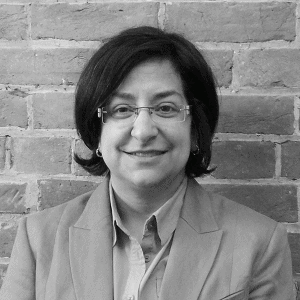 Laura Marchiori (Collections)
Laura Marchiori (Collections)
“Currently studying Archives & Records Management at U of T’s iSchool, I began volunteering at The ArQuives in 2015 in order to supplement theory with practical experience. I have a PhD in Art History and have spent many hours researching in the archives of Rome. I was always impressed by the great respect that Italians have for their archives, which are regularly frequented by all kinds of users, from the armchair historian to the professional researcher. Perhaps because we are a young nation, Canadians have embraced their archives with slightly less enthusiasm, which is a pity. Archives are storehouses of the past, repositories of knowledge and of pride, none more so than The ArQuives.”
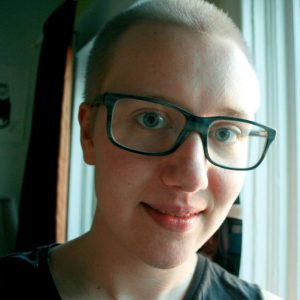 Sid Cunningham (York PhD Intern)
Sid Cunningham (York PhD Intern)
“My first visit to the archives was in the fall of 2015 when Alan Miller [our longest-serving volunteer] showed me through some of the trans-related periodical holdings at the 65 Wellesley location. A few months after this first visit, I came across an opportunity to receive funding from York University for an internship at a community organization, and jumped at the chance to spend time working at The ArQuives. I hope to stay with the archives for the long term, but interning has made it possible to dedicate a lot more time over a short period to a few bigger projects. My work so far has been focused on processing the fonds of Mirha-Soleil Ross, a transsexual artist, activist, and sex worker who was active in Toronto from 1993-2008. I’m hoping to use my background in trans theory and activism to contribute to creating a finding aid and digital exhibition that can really effectively demonstrate the significance of Ross’s work and illuminate its social and historical context for both researchers and the general public. I came of age and came out during a time when queer activism was often partially or completely internet-based, and it was possible to make connections with other queer and trans people online that sustained me through the heteronormativity of school, home, and community life. So even though the early nineties aren’t that long ago, in a sense, it’s really eye-opening to encounter the completely different kind of trans and queer community building attested to by objects like Ross’s correspondence and subcultural periodicals like Gendertrash, TransSisters and Metamorphosis. I like to think that making these kinds of artifacts accessible can help our community rethink current activism and culture in fresh ways. One of my main interests, and the focus of my PhD research, is writing by queer and trans activists that engages directly with scholarly texts. Whether they liked her or not (and most of them didn’t!) I get the sense sometimes that just about every trans person in the early nineties was reading Judith Butler, which demonstrates (to me) how high the stakes of the academic discourse on gender was (and is) for trans people. Furthermore, there’s so much variance in the way people have conceptualized gender and sexuality over time, and I think that becomes much more obvious when looking at material traces of debates over terminology that seem to be somewhat settled now but were very much not settled in another period. For example, the word “cisgender” wasn’t really in use in the early nineties so there are lots of discussions in periodicals of that era around how to refer to people that aren’t trans; Gendertrash, a periodical made in Toronto by Ross and her partner Xanthra Mackay, uses the terms “gender described” and “genetic described” and that corresponds to a whole framework for understanding identity and desire that is pretty distinct from what has become the norm today.”
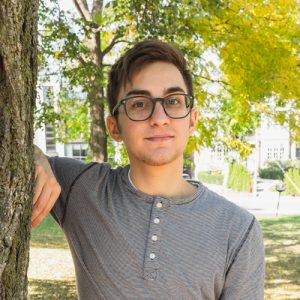 Everett Burge (Collections)
Everett Burge (Collections)
“Growing up, I had the ‘only queer kid in the small, rural community’ experience. As soon as I was able, I moved to Ottawa where I completed my undergrad in English and Women’s Studies. During my studies, I thought a lot about the amplification of certain voices or narratives in society. In my opinion, the commonality of one’s life experience does not evidence superiority. To me, it seemed the world would be a better place if people had more opportunity to understand the lives of people different from them. This conviction lead me to the University of Toronto, where I studied Archives and Records Management. I wanted to get involved with archives, especially The ArQuives, because I wanted to ensure the life stories of LGBTQ people were preserved and made accessible. Fast forward two years and I am doing exactly that. I have been processing the materials of provocateur and oft described bad boy of Canadian Theater, Brad Fraser. It’s an amazing collection of materials ranging from early drafts of his plays to a spooky air brushed pillow. In my free time I’m exploring craft breweries, reading books and listening to spooky podcasts.”
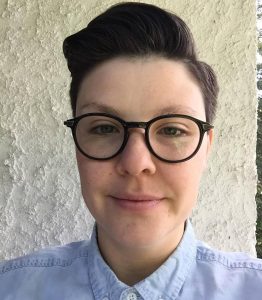 Tama Lang (Curatorial)
Tama Lang (Curatorial)
“As a young queer person, I was enthralled by the stories of LGBTQ people in the past—fictive, artistic, and academic. This relationship started, for me, through school and books. However, what interests me now is the many ways that people bring these histories to life for people who might not have access to or who might not be so interested in school or books. That is what drew me to the curatorial committee at The ArQuives. I had attended many events at The ArQuives, I did much of my Masters research at The ArQuives, and I continue to write about LGBTQ archives for my PhD research, but I eventually felt like I would like to be a part of the action. In 2015, I joined the Curatorial Committee and learned so much about what goes into staging exhibitions. This role at The ArQuives has helped me to appreciate even more the work that LGBTQ archives do to not only conserve evidence of these important pasts, but also to diversify their holdings through their relationships with the public.”
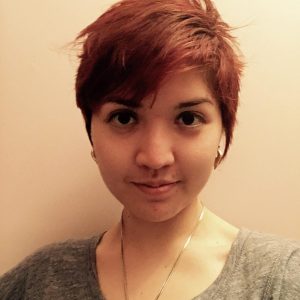 Bailey Chui (Digitization Chair)
Bailey Chui (Digitization Chair)
“I stumbled upon the archives profession by chance in my last year at the University of Toronto. I was finishing an undergraduate degree in East Asian Studies and Environmental Geography and decided one day to visit my old high school. I met with a former teacher who asked what I planned on doing after graduation, to which I replied honestly that I didn’t know. Having experienced my obsessive attention to detail and organizational skills firsthand, he recommended I look into the Archives and Records Management concentration of U of T’s Master of Information program. The prospect of professional organization was enticing and the more I learned of the program, the more I found myself falling in love with it. I sent in my application and the rest, as in the world of archives, is history. Since entering the field I’ve had the great fortune and pleasure of working in many wonderful archival institutions, including the Ontario Jewish Archives, the archives of the National Ballet of Canada, the John M. Kelly Library Archival and Manuscript Collection at the University of St. Michael’s College, and the Metropolitan Museum of Art Archives. I am currently the Acting Archival Records Analyst with the City of Vaughan, where I process public and private records, assist staff and researchers with reference questions, manage the archives’ social media content, and plan and design exhibits. When I’m not organizing and making sense of government records, you can find me organizing and making sense of records at The ArQuives where I volunteer once a week, browsing the shelves of second hand and children’s bookstores for my next great read, taking dance classes throughout Toronto, and trying my best to be less socially awkward on a regular basis.” “I first came to The ArQuives in early 2015, shortly after completing my graduate degree in Archives and Records Management at the University of Toronto’s iSchool. There are very few opportunities for new archivists fresh out of a program to find work, so I turned to volunteering in the hope that it would help me gain professional experience. I had heard very positive things about The ArQuives from classmates at the iSchool and have always had a passion for arts, culture and social equity, so I decided to give it a try. Volunteering at the archives has been a very rewarding and enriching experience. It’s rare to find an institution that gives as much responsibility to its volunteers as The ArQuives, and I’m grateful for the freedom and creative control I’m able to exercise with the records I organize, particularly as a novice archivist. I understand the amount of trust this entails on the part of the archive and it encourages me to work hard in my own professional development to carry out their vision. The nature of the archive itself was also a key motivating factor in my decision to volunteer. The ArQuives contains the stories and memories of the LGBTQ+ community, narratives which have historically been repressed and excluded. It’s wonderful that these stories are now being recognized for their value as the community gains greater acceptance and visibility, and I hope that the work I do will contribute in even a small way to keeping them alive for future generations to access.” “I’m a member of The ArQuives’s Operations Committee, which oversees collection development and management of archival material, and I’m currently processing a donation of research notes and draft papers focusing on the treatment of gay servicemen during the Second World War. Reading through the records really puts into perspective the progress we’ve made in the last half century, but it also reminds me of why we need to continue to stand against intolerance and fight for human rights. I’m also the chair of the newly created Digitization Committee, which has been focusing on managing the various digital projects, resources and strategies currently underway at The ArQuives. The archives is transitioning more of its collection to digital format for preservation purposes and also introducing new online channels to increase accessibility to its holdings, and the formation of a committee was a natural response to address these initiatives. It’s an exciting time to be part of The ArQuives and I’m looking forward to seeing the directions our hard work will be taking us.” “I wouldn’t necessarily say there’s any one piece in the archives to which I’m drawn, however I love the graphic material. The poster collection in particular has some really creative images and illustrations that enhance the political statements and advertisements, and are as much works of art as they are historic records.”
